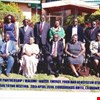

The regional Youth Parliament for Water and Sanitation of the Ouémé/ Pateau Central held a training workshop from 14 to 16 April 2016 on the topic « Youth of Oueme, protect your resource ». About fifty young people took part in the training including students, young water professionals, teachers, environment manager, economists, youth in the health and paramedical sector, socilogists, etc.
The 2015 progress report takes stock of the implementation of the activities, draws main lessons learnt and states key messages of fruitful collaboration with partners during the years. Please, download the document

The 3rd Climate Services User Forum for the Water Sector (CSUF-Water-3) held from 27 to 28 April in Colombo, Sri Lanka was successfully concluded yesterday, 28 April 2016.
Africa in particular its sub Saharan part, is one of the most affected areas in the world regarding food insecurity (Africa 2014 report on hunger, IFPRI). The agricultural sector which food security and poverty reduction depends very much on in Africa is likely to be affected by climate change if no action is taken. It is against that background that The Global Water Partnership Southern Africa held national consultations on water and food in Malawi and Lesotho on the 21st of April 2016.

Africa in particular its sub Saharan part, is one of the most affected areas in the world regarding food insecurity (Africa 2014 report on hunger, IFPRI). The agricultural sector which food security and poverty reduction depends very much on in Africa is likely to be affected by climate change if no action is taken. It is against that background that The Global Water Partnership Southern Africa held national consultations on water and food in Malawi and Lesotho on the 21st of April 2016.